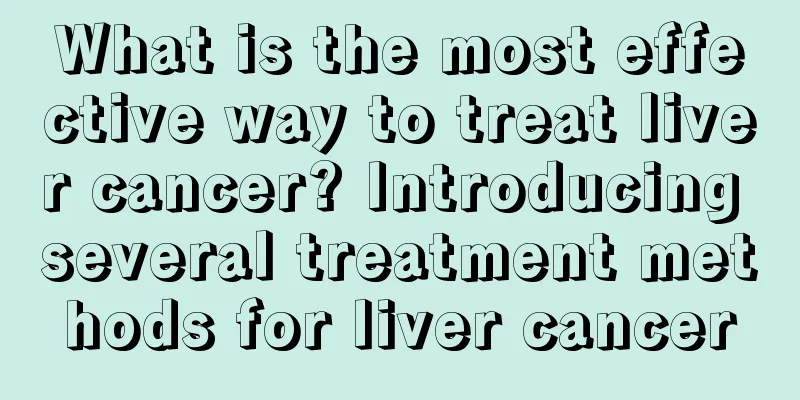What is the most effective way to treat liver cancer? Introducing several treatment methods for liver cancer

|
Among the interventional ultrasound treatments for various diseases, liver cancer is the most widely used, with the greatest differences, and the need for attention and discussion is the greatest. The incidence of liver cancer in my country is very high, with a population of about 22% of the world, but liver cancer patients account for about 50% of the world. In recent years, large-sample case reports have shown that the three commonly used treatments for liver cancer, surgical resection, liver transplantation and interventional ultrasound, are basically similar in clinical efficacy, but interventional ultrasound treatment has the least trauma to patients and lower treatment costs, and has certain advantages. In 2005, Academician Tang Zhaoyou, director of the Liver Cancer Research Institute of Fudan University in Shanghai, clearly advocated that "research on liver cancer should focus on new minimally invasive treatment methods, supplemented by major invasive methods such as surgery and liver transplantation." Comparison of the efficacy of surgery, transplantation and ultrasound intervention Surgical resection: Academician Wu Mengchao's liver cancer surgery had a 5-year overall survival rate of 48.6%; Academician Tang Zhaoyou's statistics showed that the 5-year survival rate of 1,106 cases of small liver cancer resection was 63.7%, and the 5-year survival rate of 1,465 cases of large liver cancer resection was 34.8%. Compared with ultrasound interventional therapy, surgery is relatively more traumatic, more expensive, has greater liver function reserve damage, and has more complications. The advantage of surgery is that the tumor is completely removed, while the tumor removal effect of ultrasound interventional therapy is greatly affected by the operator's technical level. Local ablation (radiofrequency, microwave and alcohol): Professor Chen Minhua's 1, 3, and 5-year survival rates of 254 cases of hepatocellular carcinoma were: 94.1%, 75.6%, and 64.3% for stage I-II HCC; 78.7%, 51.2%, and 39.8% for stage III-IV HCC; the 5-year survival rate of recurrent hepatocellular carcinoma reached 34.2%. Professor Dong Baowei reported that the 1, 2, 3, 4, and 5-year survival rates of 234 cases of liver cancer treatment were 92.70%, 81.60%, 72.85%, 66.37%, and 56.70%, respectively. Under standardized and excellent operation conditions, the three local ablation therapies have good efficacy. Liver transplantation: Fudan University reported 198 cases with 1-year and 2-year survival rates of 78% and 65%; West China reported 1-year and 3-year survival rates of 84.9% and 49.3%, respectively. For patients who cannot undergo local ablation and surgical resection, liver transplantation is the only effective treatment. However, liver transplantation is not only expensive, but also has a shortage of livers, and long-term anti-rejection treatment is required after transplantation. The comparative methods of different ultrasound interventional treatments for liver cancer include: radiofrequency ablation, microwave ablation, alcohol ablation, high-intensity focused ultrasound, cryotherapy, and intratumoral radiotherapy. Currently, the first three therapies are more widely used and have better efficacy. 1) Radiofrequency ablation: The use of electromagnetic waves with a frequency of 460 to 500kHz generates ion vibrations in human tissues, converting electrical energy into heat energy, generating high temperatures of 60 to 100°C, and causing thermal coagulation and necrosis of tumor tissues. 2) Microwave ablation: Similar to radiofrequency, it uses the thermal effect principle of 2450MHz high-frequency electromagnetic waves, and uses needle electrodes to release microwave energy in the tumor to reach a high temperature of 60 to 100°C to kill tumor cells. The advantages are that the operation is relatively simple and the electrode needle is cheap (the price difference is several thousand yuan). The disadvantage is that the controllability of the effective volume and ablation range of a single ablation is not as good as radiofrequency ablation. 3) Alcohol sclerotherapy: Use anhydrous ethanol to inject and infiltrate the tumor, causing the chemical protein of the tumor cells to coagulate, and ultimately achieve the effect of inactivating the tumor. No special equipment is required. Due to its good conformality, it is also suitable for supplementary treatment of deep tumors remaining after surgery and other ablation treatments. Especially for grassroots hospitals, it is the easiest to popularize and promote. 4) High-intensity focused ultrasound ablation: In recent years, there have been many reports. It is to focus high-intensity ultrasonic waves from outside the body to the tumor inside the body, forming a high temperature of 60 to 100°C to kill tumor tissue. In theory, it can achieve conformal coverage ablation of liver cancer. There are the following shortcomings in the treatment of liver cancer with high-intensity focused ultrasound: A. Large trauma: High-intensity sound waves may cause burns to the skin, ribs, lung tissue, intestinal wall, ligaments and nerves beside the spine, etc., which may manifest as skin burns, hemoptysis, blood in the stool, back pain, and even abnormal sensation or movement. Some treatments also require surgical removal of ribs before treatment, which is even more threatening than surgical trauma. B. Tumor ablation is not easy to be completely and thoroughly performed: Because the liver moves up and down about 4 cm with breathing, and the body position changes inevitably, it is not as uniform and complete as radiofrequency and microwave ablation. C. The use of general anesthesia or epidural anesthesia increases the pain and risk of patients. The main factors affecting the efficacy of liver cancer 1) Thoroughness of tumor inactivation: Liver transplantation and surgical resection are relatively thorough. Radiofrequency ablation and microwave ablation completely inactivate tumors in the ablation area, so tumor inactivation is also relatively thorough. The thoroughness of inactivation by alcohol injection therapy depends entirely on the control of the operating physician. 2) Comprehensive treatment effect: Comprehensive treatment should be carried out for liver cancers with different pathological characteristics. 3) Liver function: Liver cancer is often complicated by hepatitis B and cirrhosis, and liver function reserve directly affects the prognosis. 4) Patient age: Young liver cancer patients are more likely to have portal vein cancer thrombosis and early extrahepatic metastasis, and the prognosis is often worse than that of elderly patients. |
>>: How long can you live with advanced liver cancer? Two tests can detect liver cancer early
Recommend
What are the common early symptoms of lung cancer in men? These symptoms are likely to appear in the early stages of lung cancer
Experts say that men are at high risk of lung can...
Can bladder cancer be transmitted to others?
The occurrence of bladder cancer is often related...
What is the difference between premenstrual leucorrhea and early pregnancy leucorrhea?
It is a very common phenomenon for women to secre...
What exactly is prostate cancer?
Prostate cancer is a disease that can make men co...
Can moxa sticks be used to soak your feet?
As we all know, the feet are the concentration po...
How to wash yellow sweat stains under the armpits
Yellowing of armpit sweat stains is a common and ...
The difference between alkali powder and baking soda
Alkali powder and baking soda are actually common...
Advantages and disadvantages of hair transplantation
There is no doubt that everyone wants to have the...
The method of stewing chicken with Panax notoginseng root actually has such medicinal value
It is not uncommon to see chicken stewed with Pan...
How to extract cucumber water
Cucumber water is a substance that has beauty-enh...
What foods can relieve dry eyes
Every day we face computers for a long time, whet...
What to eat for nasopharyngeal cancer
Patients with nasopharyngeal cancer can eat high-...
How to repair a broken shoe zipper?
Most shoes do not have zippers, but some shoes ha...
10 signs of health from the tongue that indicate a serious illness is coming
Sometimes when we go to see a doctor, the doctor ...
What causes excessive eye mucus
With the increase of life pressure and some unhyg...









